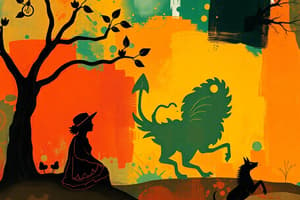Podcast
Questions and Answers
Which type of poetry often focuses on nature and the changing seasons?
Which type of poetry often focuses on nature and the changing seasons?
- Free verse poetry
- Haiku (correct)
- Sonnet
- Epic poetry
Which type of poetry is a long narrative poem that details extraordinary feats and adventures of characters from a distant past?
Which type of poetry is a long narrative poem that details extraordinary feats and adventures of characters from a distant past?
- Sonnet
- Epic poetry (correct)
- Limerick
- Free verse poetry
Which type of poetry is a 14-line poem that typically concerns the topic of love and has a specific rhyme scheme?
Which type of poetry is a 14-line poem that typically concerns the topic of love and has a specific rhyme scheme?
- Haiku
- Sonnet (correct)
- Limerick
- Free verse poetry
Which type of poetry is free from the constraints of a regular meter or rhythm and does not rhyme?
Which type of poetry is free from the constraints of a regular meter or rhythm and does not rhyme?
Which type of poetry is a five-line poem that follows an AABBA rhyming scheme?
Which type of poetry is a five-line poem that follows an AABBA rhyming scheme?
Which type of poetry is measured in sounds, or 'breaths,' rather than syllables?
Which type of poetry is measured in sounds, or 'breaths,' rather than syllables?
Which type of poetry is often as long as a book and has a dignified style?
Which type of poetry is often as long as a book and has a dignified style?
Which type of poetry was written by John Milton and Homer?
Which type of poetry was written by John Milton and Homer?
Which type of poetry was written by Walt Whitman and William Carlos Williams?
Which type of poetry was written by Walt Whitman and William Carlos Williams?
Which type of poetry has two types: the Italian sonnet and the English sonnet, also known as the Shakespearean sonnet?
Which type of poetry has two types: the Italian sonnet and the English sonnet, also known as the Shakespearean sonnet?
Study Notes
Types of Poetry
Poetry is an art form that has been practiced for centuries, with various forms and structures developed throughout history. In this article, we will discuss different types of poetry, including epic, free verse, sonnet, haiku, and limerick.
Epic Poetry
An epic poem is a long narrative poem that details extraordinary feats and adventures of characters from a distant past. These poems can be as long as a book and often have a dignified style. Examples of epic poetry include "Paradise Lost" by John Milton and "The Iliad" and "The Odyssey" by Homer.
Free Verse Poetry
Free verse poetry is a form of poetry that is free from the constraints of a regular meter or rhythm and does not rhyme. Instead, the poet focuses on the sounds and flows of the words. Free verse poetry can be found in works by Walt Whitman and William Carlos Williams.
Sonnet
A sonnet is a 14-line poem that typically concerns the topic of love. There are two types of sonnets: the Italian sonnet and the English sonnet, also known as the Shakespearean sonnet. Both types have specific rhyme schemes and structures.
Haiku
Haiku is a form of Japanese poetry that consists of three lines of five, seven, and five syllables. Originally, haiku poetry was measured in sounds, or "breaths," rather than syllables. Haiku often focuses on nature and the changing seasons.
Limerick
A limerick is a five-line poem that follows an AABBA rhyming scheme. Limericks are known for their light-hearted and humorous nature and were popularized by Edward Lear.
Each of these poetry types offers a unique approach to storytelling, expression, and emotion. Understanding the characteristics of each form can help poets choose the best structure for their work and allow readers to appreciate the nuances of the poetry they encounter.
Studying That Suits You
Use AI to generate personalized quizzes and flashcards to suit your learning preferences.
Description
Explore different types of poetry such as epic poetry, free verse poetry, sonnet, haiku, and limerick. Understand the unique characteristics and structures of each form, from long narrative epics to short and humorous limericks.




